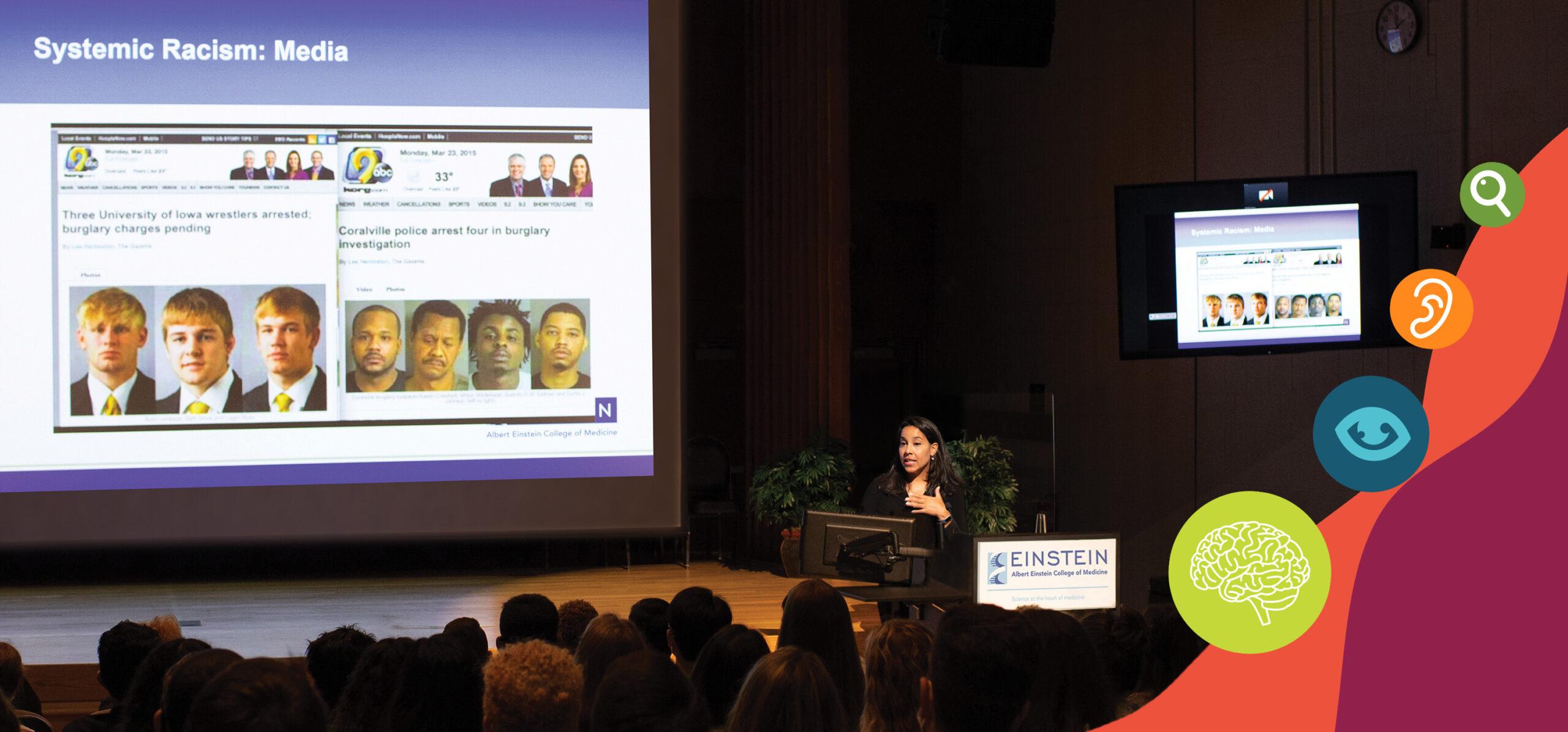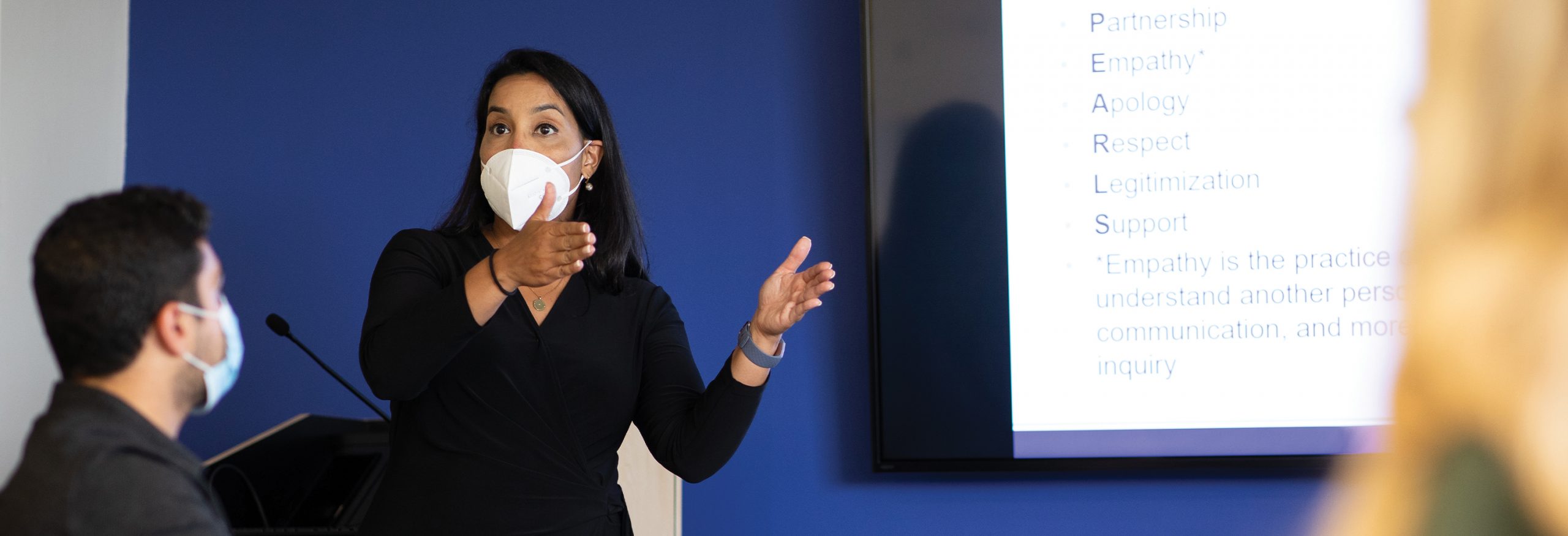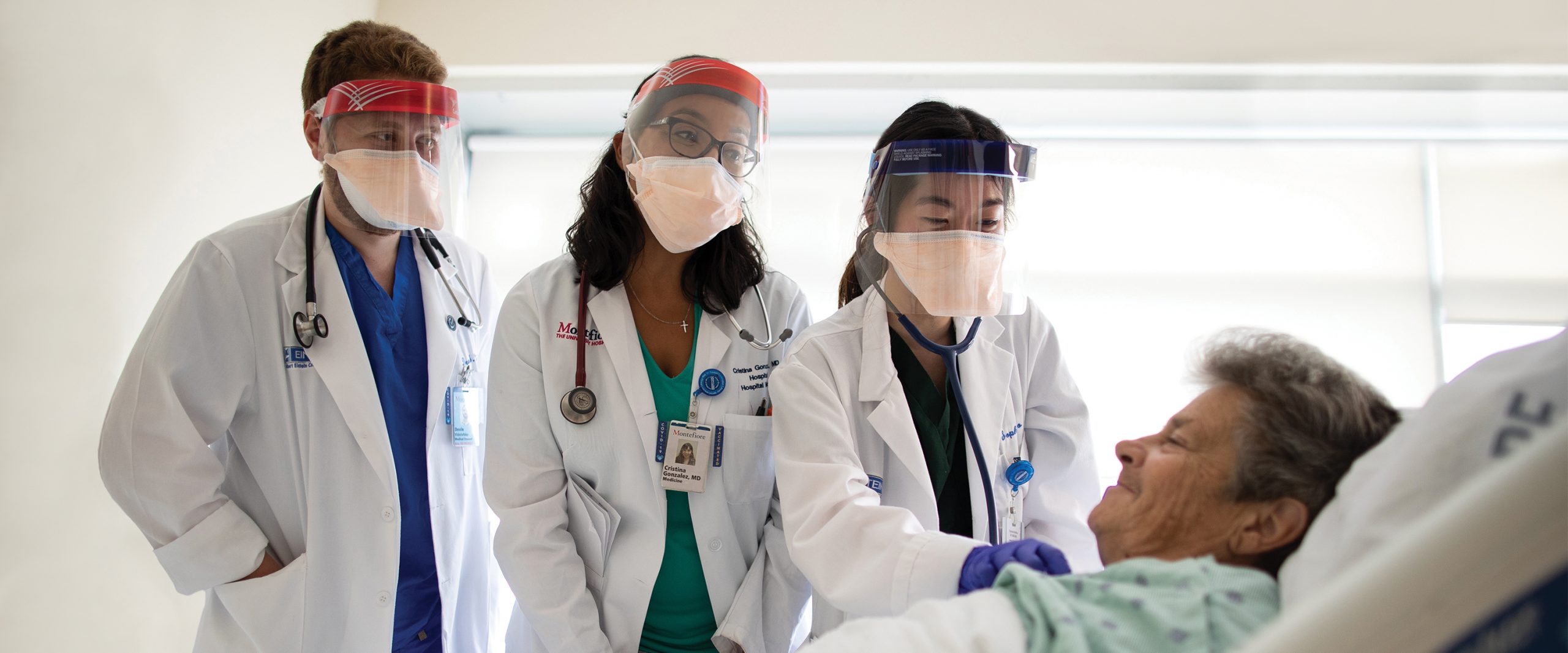
A young Black man with an elbow injury sits on an examination table in his doctor’s office. She asks him questions before looking at his arm.
“Do you smoke?” the doctor asks.
The patient bristles. Why did she ask him about smoking? he wonders. What does that have to do with a swollen elbow? Is she judging him or making a negative assumption about his personal habits because she thinks all young men who look like him smoke?
As he leaves the doctor’s office, he crumples up her instructions for caring for his elbow and never returns for a follow-up visit.
Cristina Gonzalez, M.D. ’04, M.Ed., uses that young man’s example when talking to Einstein medical students about implicit biases—those unintentional assumptions all of us make about others without even realizing we are doing it. The implicit biases of physicians and other healthcare professionals—about race, age, sexual orientation, weight, or gender, for example—may affect the quality of healthcare that their patients receive, says Dr. Gonzalez, professor of medicine at Einstein and a hospitalist at Montefiore.
In the case of the young man with the injured elbow, Dr. Gonzalez says, it’s not only the unconscious bias of the physician that’s relevant in the interaction, but also the perception of bias by the patient.
These biases can affect communication with patients and the medical decisions that physicians make, thereby contributing to healthcare disparities.
— Dr. Cristina Gonzalez
The past year and a half has drawn attention to terms such as “bias,” “systemic racism,” and “health disparities” as a result of a deadly pandemic that has disproportionately killed people of color, along with nationwide protests after the brutal and shocking murder of George Floyd.
Despite the recent rise in people’s awareness, the underlying issues are nothing new. It is in this context that doctors must negotiate intimate and sensitive interactions with patients, many of whom they meet for the first time when the patients are stressed because of injury or illness.
In the example of the man with the injured elbow, the physician may not have realized that her patient would interpret her routine question as being biased. If she had, she might have established a better rapport by first telling him that she was going to ask a question that might seem off the topic but was something she asked all of her patients.
“We enter the field of medicine with the intention to help others,” Dr. Gonzalez says. “But our upbringing, socialization, and culture influence our views and lead us to have implicit or unconscious biases. This is true for everyone—you cannot go through life without developing some biases. The issue is that in medicine, these biases can affect communication with patients and the medical decisions that physicians make, thereby contributing to healthcare disparities.”

One of the most widely cited examples of how implicit bias can harm patients is a 2007 study in the Journal of General Internal Medicine. It set out to test whether physicians showed implicit bias when they were treating Black and white patients with acute heart conditions.
Nearly 300 internal-medicine and emergency-medicine residents at four academic medical centers in Atlanta and Boston were surveyed. The physicians reported no explicit preference for Black or white patients, but the Implicit Association Test they took told a different story about their preferences. (Learn more about the test below.) As their scores favoring white patients increased, so did the likelihood that they would treat white patients—but not Black patients—with clot-busting drugs for heart attacks.
A somewhat controversial tool from Harvard University, the Implicit Association Test (IAT) is an online measure of reaction time to images and value-laden words designed to measure a person’s unconscious biases.
A growing body of research has shown that the IAT cannot accurately measure bias nor predict biased behavior based on taking it a single time. Rather, the test must be taken many times before any conclusions can be drawn about bias and how it guides a person’s behavior.
Dr. Gonzalez remembers when Paul Marantz, M.D., M.P.H., now associate dean for clinical research education and professor of epidemiology & population health at Einstein, showed her the study when they were on Einstein’s Clinical Prevention and Population Health Task Force in 2009. “I can work on that!” she recalls thinking. It was a turning point. Since then she has expanded the existing research on implicit bias and developed ways to address it in order to improve patient outcomes. It has become what she calls her “singular professional passion.”
Over the past several years, Dr. Gonzalez has published 16 papers on the topic of implicit bias. Most recently, her 2020 Academic Medicine paper outlined the curriculum she and her team designed and piloted as an elective for first-year medical students. It is the first published curriculum that provides students with opportunities to practice and develop skills that help them address biases in their encounters with patients and in the learning environment.
The training at Einstein starts as medical school begins, when first-year medical students are introduced to the concept of implicit bias during orientation week.
They learn that type 1 or “fast, automatic” thinking helps brains develop shortcuts for processing the enormous amount of information that people encounter daily—shortcuts that enable them to act almost without thinking, but that are shaped by how people are raised and by biases absorbed over the years from the media and other influences.
Fast thinking can produce an unconscious preference for certain people, such as those who look like ourselves, and a bias against others. In contrast, more purposeful and reflective type 2 or “slow” thinking can help a person avoid making incorrect assumptions.
Faculty members and senior students lead the first-years in small-group discussions where they have in-depth and sometimes emotionally charged conversations about their own experiences and thoughts on bias and how it may affect their interactions with others.
A central teaching tool now being used during orientation is an animated short film narrated by actor Whoopi Goldberg about implicit bias and empathy that made its world debut at Einstein in August. It is a product of Dr. Gonzalez’s collaboration with the Empathy Project and faculty at New York University’s Grossman School of Medicine, and is being shown to medical students outside of Einstein as well. The film focuses on a Black female patient’s interaction with her doctor during an appointment for stomach pain. Dr. Gonzalez helped develop an accompanying video to aid students in recognizing and managing their implicit biases.
Einstein group workshop leader and fourth-year medical student Marla Renee Fisher says her perspective on bias has evolved significantly since she arrived at Einstein. “Physicians have a lot of power. We have the power to help our patients heal, but with that power also comes the potential to cause harm, even though we don’t intend to,” she says. “Learning how to pay attention to our assumptions, whether they’re about race, class, body size, disability, gender, sexuality, or immigration status, is a critical skill for future physicians.”
In the first-year students’ Introduction to Clinical Medicine course, the implicit-bias curriculum focuses on relationships with patients. “If patients feel dismissed or belittled by doctors, nurses, or support staff, they may avoid or delay medical care,” Dr. Gonzalez says, noting the findings of a study she led that were published in 2018 in Patient Education and Counseling. “Physicians can salvage the relationship by recognizing and managing their biases or having empathy and understanding for the patients’ perceived biases—or both. That’s the ‘aha’ moment—we realize that we can take steps to get the patient encounter back on track.”
The third-year Patients, Doctors, and Communities course asks medical students to write about instances of bias they have seen on the wards and to focus on strategies for dealing with difficult situations. Accepting that implicit bias exists in everyone, says Dr. Gonzalez, helps remove its stigma and lets people more readily address their own—or others’—behaviors.
We’re testing measurements of bias and collecting hard data. Then we can plan the next step: designing interventions that improve a doctor’s ability to provide appropriate care.
— Dr. Cristina Gonzalez
Dr. Gonzalez received an Association of American Medical Colleges New Investigator Award for her 2018 Academic Medicine paper, which contained interviews with 21 Einstein and Montefiore faculty members on the challenges of teaching about implicit bias, where they revealed their discomfort and hesitancy. One participant said, “As the speaker, you’re so anxious that you’re going to say something wrong that you may not want to talk about it at all.”
In a 2019 study in the Journal of General Internal Medicine, she asked 56 medical students their opinions of implicit-bias instruction; she found a range of attitudes. Some students resisted the idea of implicit bias, while others felt shame about their own biases. Some said they had witnessed bias but felt powerless to address it.
The National Institutes of Health (NIH) in 2019 awarded Dr. Gonzalez a five-year, $850,000 grant to continue building a road map for addressing and managing physician bias in clinical encounters
She’s developing scenarios where people have to make decisions, and their behaviors are measured in a very rigorous, scientific way. It’s really breaking some new ground.
— Dr. Paul Marantz
“We are looking at patients who have pain and cardiovascular disease and how they are treated,” she says. “We want to know whether implicit bias influences doctors’ decisions. We’re testing measurements of bias and collecting hard data. Then we can plan the next step: designing interventions that improve a doctor’s ability to provide appropriate care.”
Dr. Gonzalez and her Einstein colleagues are now developing simulations involving Black and white standardized patients (the actors who portray patients in training exercises for medical students). She and her colleagues are analyzing the behavior of physician volunteers to determine whether there is an association between their implicit biases and the medical decisions they make, particularly under stressful conditions.
“She’s developing scenarios where people have to make decisions, and their behaviors are measured in a very rigorous, scientific way,” says Dr. Marantz. “It’s really breaking some new ground.”
One Einstein graduate, who met Dr. Gonzalez in a health-disparities course several years ago, was inspired by Dr. Gonzalez to fight actively against bias and racism. “She’s such a fierce advocate, and she has been a constant presence in the work that I’ve done,” says Elise Mike, M.D., Ph.D. ’21, who started Einstein’s chapter of White Coats for Black Lives. “I’m really excited to see what comes next as a result of her work.”
Dr. Gonzalez believes that her NIH-funded study, which runs through 2024, is the logical next step in addressing “a critical gap in knowledge” about implicit bias and will lead her and others to discover rigorous methods aimed at giving physicians additional clinical skills to mitigate bias and improve patient care.
“If we can help physicians gain skills to recognize when bias is influencing their encounters with patients, and to make clinical decisions in line with what they would have made if bias weren’t an influence, then we can make important strides toward achieving health equity,” Dr. Gonzalez says.
